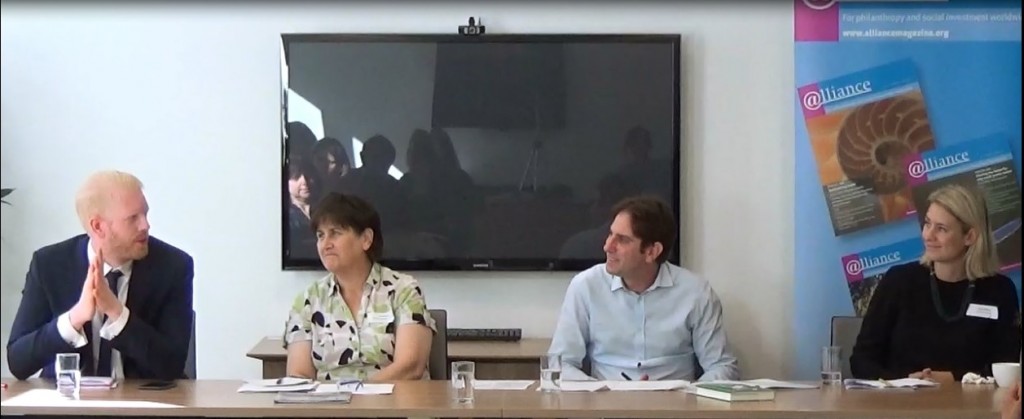The September 2016 Alliance breakfast club, kindly hosted by Charities Aid Foundation (CAF) focused on the influence of philanthropy, and what limits, if any, should be imposed. The discussion was rooted in Alliance magazine’s September 2016 special feature: Does philanthropy have too much influence?
The panel included Sally Berkovic, Chief Executive of Rothschild Foundation Europe, Dr Linsey McGoey, Senior Lecturer in Sociology at the University of Essex and Adam Pickering, International Policy Manager at CAF. The event was chaired by Charles Keidan, editor of Alliance.
The discussion centred around the nature of philanthropic influence and the struggles associated with criticising philanthropy. As governments increasingly have fewer resources available to them, philanthropy has become much more prominent and assertive, but is this rise a panacea or a problem?
Linsey McGoey opened the discussion by setting out the three problems she believes philanthropy faces: strategic ignorance, self-dealing and scrutiny. McGoey said that there is a ‘cultural taboo’ about questioning the virtue of philanthropy, and that an ‘odd paradox’ exists as pointing out flaws in the philanthropic process can be perceived as criticism of the notion of philanthropy itself.
Noting the rise of Limited Liability Companies (LLC’s) such as the Chan Zuckerberg Initiative as philanthropic vehicles, McGoey stated her concern that such organisations are able to skirt the disclosure requirements faced by regular charitable or 501C3 organisations. Despite coming from a well-meaning place to guard against self-dealing, the lack of transparency makes it ‘very hard to independently evaluate such organisations’. McGoey concluded that the primary concern around the influence of philanthropy should be the question of ‘How do we know if philanthropy has too much influence?’
Sally Berkovic was next to speak, stating that there is a perception that something is sinister about the influence of philanthropy, but that ‘influence’ could be another way of saying ‘strategic thinking’. Foundations use their influence for good purposes by ‘pro-actively developing networks’. Organisations such as the Rothschild Foundation Europe are in a ‘uniquely strong position to bring people together’. The majority of their grants deal with Jewish heritage, and the foundation uses its influence to invest in creating platforms for e-learning and digitisation of resources. This helps to develop co-ordination between different national Jewish communities, and projects to ensure that grants ‘inspire new creativity and broaden knowledge’, rather than just preserving existing Jewish heritage. This is an example of philanthropy using its influence responsibly. Berkovic concluded by saying that when ‘managed sensitively and strategically, philanthropy is a great way to distribute resources for social change’.
Adam Pickering acknowledged that major philanthropists have disproportionate influence over society but then cautioned about the perils of curtailing the influence of philanthropy. He argued that the ‘unintended consequences would be too severe’.
Referring to his article in the September 2016 issue of Alliance magazine, Pickering says that there is a serious danger of pushing philanthropy towards ‘effective altruism’, and causing it to only focus upon measurable impact. At its best, philanthropy is well placed to tackle underlying systemic problems and take risks with funding, and this is endangered by attempts to restrict its influence.
As the majority of existing caps on philanthropic funding are in the form of a percentage of taxable income rather than a fixed-value, major philanthropists can still spend heavily and caps would have a disproportionate impact on smaller donors, and consequently the causes they support.
Pickering also expressed concern that social change can be achieved through the same methods used to build up their for-profit companies especially among tech billionaires. Are ideas rooted in the business world necessarily the right tool to address problems in the social world?
The discussion ended with audience reflections on whether philanthropists can be criticised for how they earn their own money and choose to spend it. There was acknowledgement from parts of the audience that philanthropists giving something back is better than them giving nothing. In response, Pickering pointed out that ‘wealth creation is fundamentally political and that everyone has the right to debate the allocation of resources’.
–
Does philanthropy have too much influence? Click here to read our September 2016 issue guest edited by Ingrid Srinath and Bhekinkosi Moyo
Sam Desborough is Marketing Officer at Alliance magazine.







Comments (0)